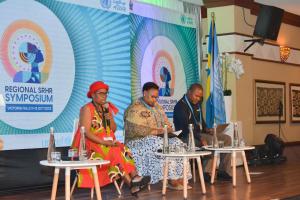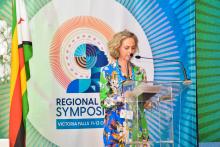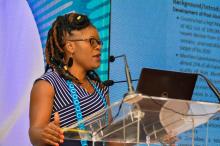An enabling environment, investments and political will could change the SRHR narrative in Zimbabwe and Africa
By Vivian Mugarisi
Despite proven impact of sexual and reproductive health and rights (SRHR) on maternal, new-born, child, and adolescent health outcomes, underfunding of SRHR issues persists. Significant proportion of the population particularly adolescent girls and young people do not have access to adequate SRHR services. For most countries in Africa, this has been mainly due to incoherent policy instruments sometimes because of delays in alignment to the constitutions, weak political commitment, inadequate resources, and countries’ reluctance to address issues related to sexuality openly and comprehensively. While progress has been noted over the past few years, these efforts continue to be threatened by the region’s high new HIV infection rates amongst young women, exposing the need to re-strategize and invest to ensure more young people have access to comprehensive SRH services.
To address some of these challenges, Zimbabwe implemented the 2gether4SRHR programme. The programme, led by the Ministry of Health and Child Care (MoHCC), is a joint partnership between four United Nations Agencies (UNAIDS, UNFPA, UNICEF and WHO) and Sweden that provided US$10 million to Zimbabwe between 2018 and 2022 to contribute to improvement in SRH for all people in the country. MoHCC also worked with the government parastatals such as the National AIDS Council (NAC) and Zimbabwe National Family Planning Council (ZNFPC) and civil society organization who include ACT, AFRICAID, Family AIDS Caring Trust (FACT), MAC, MASO, RHRN, Roots, Rossaria Memorial Trust, World Vision, Youth Engage, ZAPSO, ZICHIRE and Zimbabwe Network of People Living with HIV (ZNNP+).
Providing a platform for countries who have been implementing the 2gether4SRHR programme to compare notes, Zimbabwe hosted a three-day Regional SRHR Symposium in Victoria Falls from 11-13 October 2022. The symposium also sought to take stock of the achievements and lessons learnt through the implementation of the programme.
“Support by Sweden has improved access and flexibility of funding made it possible for the Government of Zimbabwe to respond to other areas of SRHR particularly during cyclone idai,” said MoHCC Public Health Chief Director Dr Munyaradzi Dhobbie officially opening the symposium.
“Funding provided through the 2gether4SRHR programme facilitated identifying and addressing bottlenecks, that were preventing the intended beneficiaries from enjoying their right to appropriate health care and wellbeing, while integration of available services was identified as a key enabler for broadening service access,” added the UN Resident Coordinator for Zimbabwe Mr Edward Kallon.
Through the 2gether4SRHR programme, access to services improved through integration of critical SRHR, HIV and sexual and gender based violence (SGBV) related services. Percentage of health facilities providing integrated SRHR/HIV/SGBV services in 2gether4SRH supported districts increased from 0% (in 2018) to 99% in 2022. Integration of family planning and HIV services at clinics like the ZNFPC Lister House Clinic in Bulawayo saw an increase to 3391 clients in 2021, from 1 557 recorded in 2019. The flexibility of funding enabled agility in responding to public health emergencies through strengthening of community systems that supported the most vulnerable members of society. Responses in cyclone Idai ravaged communities saw agencies providing integrated services through mobile clinics, making services easily accessible to communities that had been cut off due to the devastation
The programme enhanced data for decision making through health situation room and National health spending assessment integrating HIV and SRH. The SADC scorecard was domesticated as a review tool while capacity gaps were identified and supported in 13 districts to generate learning. In addition, a comprehensive assessment of the public health system’s readiness to provide PAC services in Zimbabwe was conducted. The termination of pregnancy Act was reviewed while the Willful transmission of HIV Act was developed and submitted to Parliament. Both Acts awaits finalization.
“The 2gether4SRHR programme has clearly demonstrated how strategic partnerships and joint efforts of the government, developmental partners, CSOs and UN agencies can successfully deliver integrated services for women and girls on SRHR/HIV/SGBV,” said Zvanaka Sithole WHO Zimbabwe Technical Officer responsible for Family and Reproductive Health.
While a lot has been achieved, countries however need to align their policies with the constitution to promote better access to SRHR services. Increase in domestic funding to further strengthen the health systems from the primary care level is also paramount. In line with the universal coverage goal, health systems strengthening will also ensure Zimbabwe, and countries in Africa can also withstand natural disasters and other shocks such as the COVID-19, that have hindered provision of essential health services.
Speaking at the closing session, MoHCC Family Health Director Dr Mervyn Venge encouraged countries to engage all partners to ensure the full adoption and implementation of global and regional commitments with a focus on integrated approach to service delivery (as opposed to silo approaches) in the quest to achieve universal health coverage.
He said…
“Key issues that have come out from the symposium is the need to take a health systems approach as we strengthen SRH, HIV and Gender Based Violence (GBV) Integration. As we strengthen our systems, we also need to focus on straightening the primary healthcare system including community health.
“We now need to also align policy instruments with our respective constitutions to ensure that our approach is comprehensive and coherent with our goal of ensuring better access to SRHR services for all.”
Countries also have to ensure that all components of SRHR which include family planning, antenatal, childbirth and postnatal care, post abortion care and safe abortion in the context of the law are catered for at primary health care level to promote better access. Within the renewed commitment of primary health care, there is need to ensure adequate resources are allocated towards enhancing access to SRH services by the young people. Community involvement remains key.
“Strengthening systems resilience is the only way to move forward. The COVID19 pandemic showed us that there are fault lines and we need to learn from these and unlock opportunities that can guide us as we move forward,” noted UNFPA East and Southern Africa Regional Office (ESARO) Deputy Regional Director Chinwe Ogbonna. “Going forward we need to focus more on implementation of strategies that have brought desired results, sharing experiences and investing in interventions that will help build resilience within our health systems,” added WHO AFRO Public Health Officer, Ian Askew.
Public-private partnerships also remain important as an avenue of resource mobilization and support. Also, the need to scale-up best practices that will further establish the credibility and value of universal health coverage has never been urgent. Capacity building of the civil society including community based organizations could promote participation and ownership while creating demand for services in the respective communities.
“Regional cooperation remains critical in realizing SRHR goals across the continent and Sweden remains committed towards supporting SRHR and ensure even those in marginalized are reached,” says Head of Regional SRHR Team of Sweden, Mrs Elizabeth Harleman.
She added; “The past days have been fruitful and next step is to make assessment of the new proposal and hopefully we will be able to take a decision on the next chapter early next year.”







